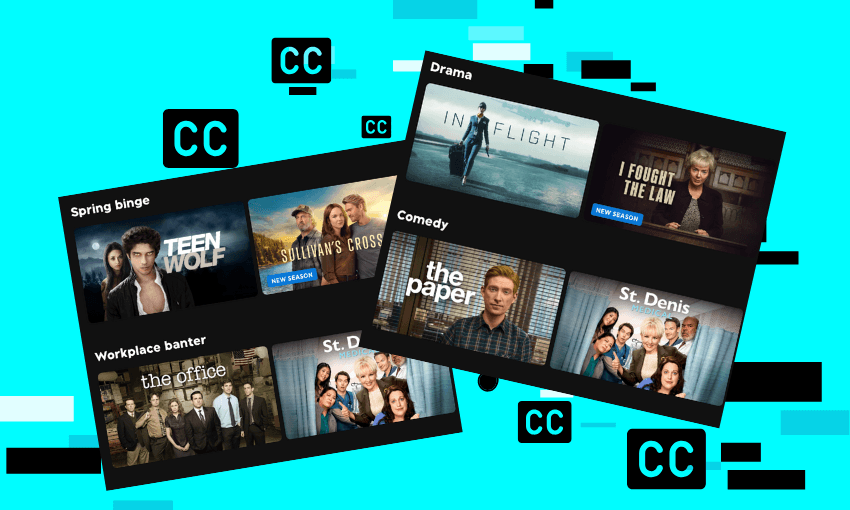TVNZ viewers have been left frustrated by closed captions disappearing halfway through a season – if they were ever there at all.
Television fan Joanna McLeod was engrossed in watching Laid on TVNZ+ – a high concept comedy about one woman’s exes all mysteriously dying after dating her – when something curious happened. McLeod had been using the closed captions on every episode, only to have them suddenly disappear after episode six. “Now I can’t watch the rest of the show,” she says. “All I want is to find out how many more men she kills with her magical vagina.”
As found in NZ On Air’s Where Are The Audiences survey, 44% of people in Aotearoa over the age of 15 now use captions every day, and for a variety of reasons beyond being hard of hearing. For example, McLeod’s introduction to closed captions was while watching the Scottish time travel romance Outlander. “It made it much easier to follow along, especially with all the different old Scottish people who all looked a little bit the same to me,” she says.
Trust her, she’s a nurse.
But in 2022, the need for closed captions became more vital. McLeod contracted long Covid, and describes how the subsequent brain fog made watching her beloved television the most “hideous, awful” experience. She compares it to trying to understand the 1970s Italian hit song ‘Prisencolinensinainciusol’ by Adriano Celentano, which was written to sound like it was in the English language, despite not containing a single comprehensible English word.
“Everything to me is like watching that – like people are speaking words you know, but you don’t understand them,” she says. Add in an ADHD diagnosis, and she says captions have become an essential part of her viewing experience. “Without them, I will struggle to follow along and it is just so much mental fatigue.”
While she found captions were readily available on big streamers like Netflix and Disney, McLeod struggled closer to home with TVNZ+. For example, St Denis Medical has captions on the first episode, but nothing more. The Office spinoff series The Paper, one of the most anticipated comedies of the year, only has captions until episode six. Start looking and you’ll notice the absent CC everywhere, from New Amsterdam S5 to the latest episode of Tulsa King.
Halfway through The Paper, the CC disappears
TVNZ spokesperson Rachel Howard tells The Spinoff that currently around 60-65% of TVNZ+’s video-on-demand catalogue is captioned. By comparison, TVNZ’s free-to-air broadcast offerings fare much better with nearly 100% captioning, thanks to accessibility agency Able. Funded through NZ On Air to provide captioning for all TVNZ channels, Able’s work also carries over to TVNZ+ when the programme arrives on demand.
So where does that leave the remaining 35-40% of caption-free content? “We ask all our international distributors to provide us with caption files when we buy a show for TVNZ+,” says Howard. “Some are happy to oblige, but not all do unfortunately.” TVNZ has trialled AI captions with mixed results. “It’s great with an American romcom, less good with crime procedurals with lots of forensics jargon or local content with New Zealand accents and te reo Māori.”
While Howard is optimistic that AI captioning will improve in the coming years and become a more viable option, she adds that TVNZ is also working with Able to ensure its work continues to have the biggest impact as more viewers move from broadcast TV to streaming. “Where possible, resourcing is being shifted so that shows can be captioned up front to service binge streaming and the weekly broadcast TV schedule,” she says.
But with the volume of TVNZ+ far outpacing broadcast TV, and Able’s funding only going so far, Howard says there remain challenges in the quest for 100% captioning. “We don’t receive taxpayer funding, so we have to find ways to increase our accessibility through our commercial revenues. We’ve made a lot of progress with captioning in the past few years, we have a way to go and for us it’s a long-term play.”
In the meantime, McLeod has become familiar with a feeling of trepidation when starting a new TVNZ+ series. “That’s the frustrating thing – do I get invested in this TV show or not?” And while that means she may have to wait to know the fate of the killer vagina in Laid, it also highlights a much bigger problem. “It’s just another reminder of the way that the world is ableist and doesn’t even think about it,” she says.
“TV is such an important part of society and, without making it fully accessible, we’re leaving key groups out.”

